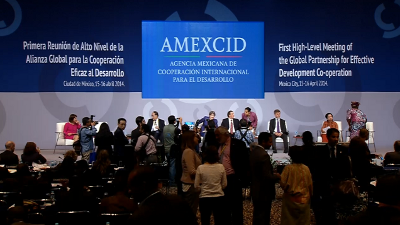USAID/Indonesia Breaks the Development Mold Through South-South and Triangular Cooperation

USAID/Indonesia’s new 5-year strategy recognizes Indonesia’s rising role as a regional leader. The strategy focuses on equal partnership and co-investment in the future of Indonesia, moving beyond the traditional donor-recipient relationship. Earlier this year, USAID and the Government of Indonesia (GOI) further solidified their partnership through a Memorandum of Understanding (MoU). The Indonesian Minister for Foreign Affairs Marty Natalegawa and U.S. Secretary of State John Kerry signed the MoU on South-South and Triangular Cooperation (SSTC) on February 17, 2014.
SSTC breaks away from the traditional development model, by looking to developing countries to provide assistance and share development knowledge among themselves. South-South Cooperation (SSC) connects nations in the developing world with shared political, economic, and social interests, and allows them to share knowledge, experiences, resources, and expertise. Through SSTC, a third country—the US in this case—supports the SSC model, by co-funding the development assistance and/or providing capacity building activities to ensure effective results-oriented assistance.
Currently, USAID and the GOI are co-designing the SSTC component of USAID/Indonesia’s strategy. Representatives from both GOI’s National Coordination Team, the four Ministries tasked with leading SSTC, and USAID communicate regularly and are jointly drafting the project design documents. Importantly, GOI and USAID are also focusing on inclusive design, including civil society organizations, academia, think tanks, and the private sector as partners in SSTC. Furthermore, USAID is working closely with development partners in Indonesia to design a collaborative program that leverages financial resources and time from partners. This allows for not only a better collaborative program, but also reduces the burden on the GOI of working with multiple development partners with different objectives and requirements. In this model, the process is as important as the outcome— providing a path to true partnership and inclusive engagement.
USAID is engaged in similar SSTC work in Brazil, South Africa, and Mexico. On April 16, Indonesia shared its experience with SSTC at the Global Partnership for Effective Cooperation meeting in Mexico City. Indonesian Minister for National Development and Planning Armida Alisjahbana co-chaired a panel with Mexican Minister of Foreign Affairs Jose Antonio Meade Kuribena on SSTC and its contribution to the post-2015 development agenda as well as showcased examples of effective knowledge sharing for development.
Watch the recording of the event's closing ceremony:



